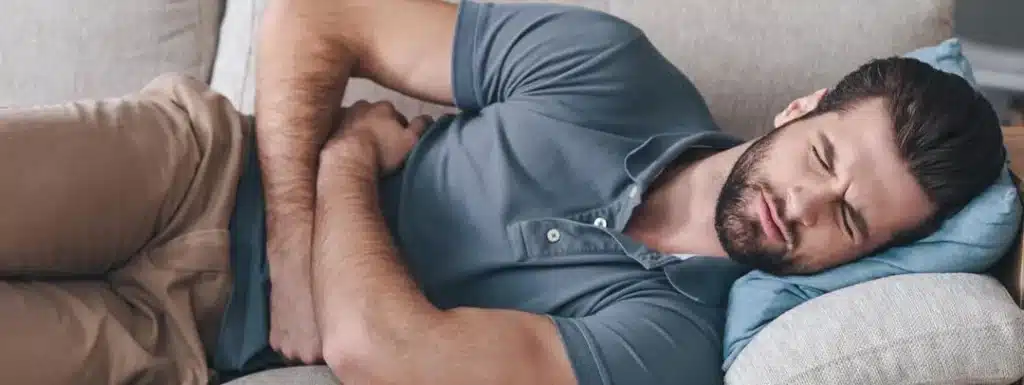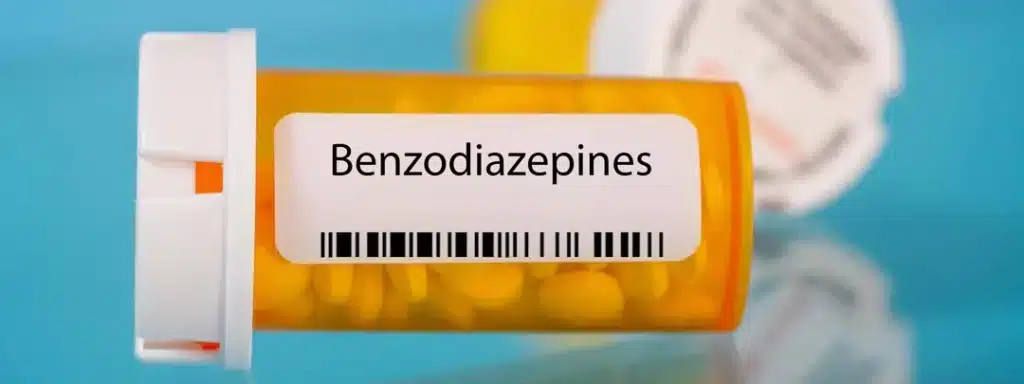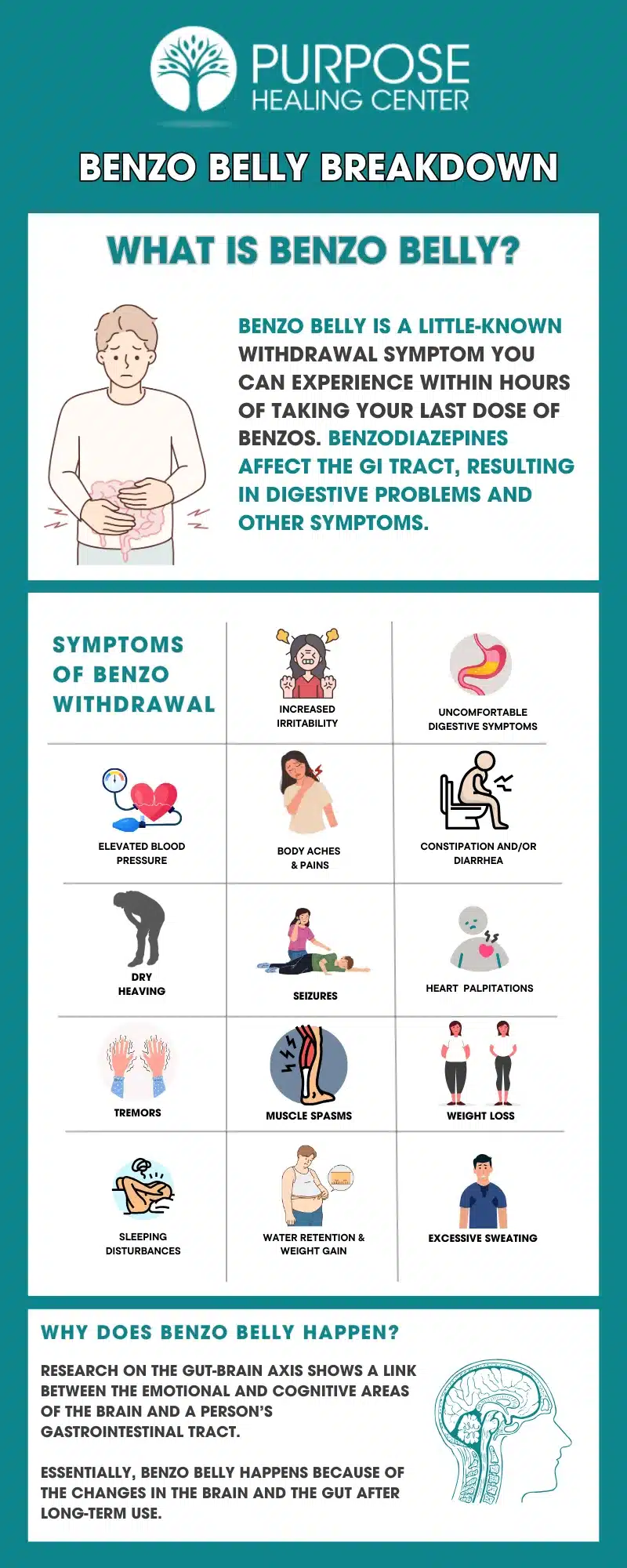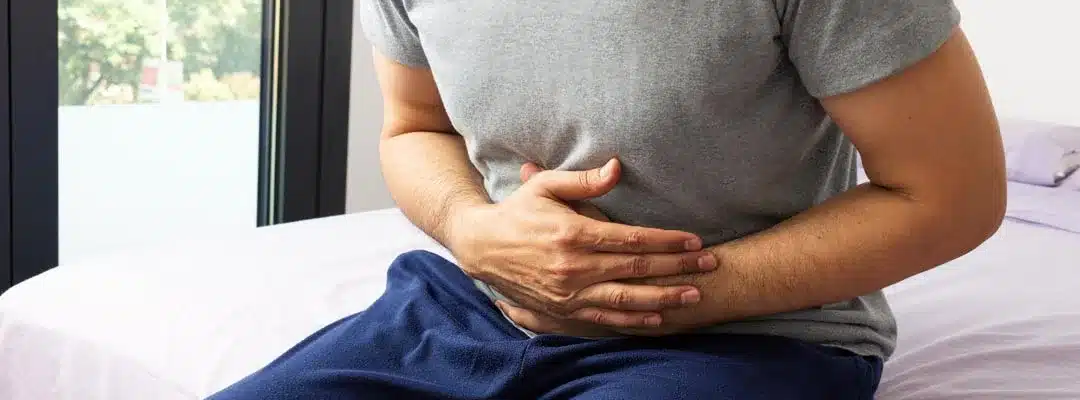Know Benzodiazepine Side Effects and Get Support at Purpose
Benzodiazepines have a calming, relaxing effect and may be used to treat anxiety or sleeping problems. Valium, Xanax, and Klonopin are examples of common benzodiazepines. Dependence on benzos happens quickly. If you try to quit on your own, you may experience symptoms like abdominal pain and cramping within hours of skipping the dose.
So, what is benzo belly and when will the symptoms subside?
Benzo belly describes the gastrointestinal problems that are common after you stop taking benzos. Even if you are prescribed benzodiazepines, it can be helpful to attend rehab during the withdrawal process.
At Purpose, we offer medical detox, mental health treatment, and individual, group, and other therapies as part of our comprehensive program. This can make the withdrawal period more comfortable and provide a safe place to learn skills for handling anxiety, insomnia, drug cravings, and stress after rehab.
What is Benzo Belly?
When you use benzodiazepines, it does not take long to develop psychological and physical dependence on the drug. As we started by mentioning, the term ‘benzo belly’ describes the uncomfortable gastrointestinal symptoms associated with withdrawal from benzodiazepines.
Some people experience muscle tension all over their body, but cramps in the abdomen and GI tract are most common.
Why Does Benzo Belly Happen?
Even though benzodiazepines are more known for their effects on the brain, many people experience gastrointestinal symptoms after withdrawal. Benzo belly occurs because of the gut-brain connection. Research on the gut-brain axis shows a link between the emotional and cognitive areas of the brain and a person’s gastrointestinal tract.
Essentially, benzo belly happens because of the changes in the brain and the gut after long-term use.
GABA receptors in the brain and the bacteria in the gut that produce GABA also play a role. Benzodiazepines make GABA receptors in the brain work better. They also interact with these receptors, so the bacteria in your gut work less. When you stop benzos, it takes time for these gut bacteria to function properly. Additionally, the gas the bacteria produce when they start functioning again causes bloating and gastrointestinal upset.
Benzo Belly Symptoms

Benzo belly is a little-known withdrawal symptom you can experience within hours of taking your last dose of benzos. Benzodiazepines affect the GI tract, resulting in digestive problems and other symptoms.
Among the many potential symptoms of benzo belly, the most common are abdominal pains, bloat, constipation, diarrhea, and appetite increase. Like other benzodiazepine withdrawal symptoms, benzo belly subsides with time. However, it takes time for your body to start functioning on its own after developing a dependence on the drug.
Benzo belly lasts for varying periods of time. It subsides in a few weeks for some people, but others experience this symptom for over a year after they quit benzos.
Other Symptoms of Benzo Withdrawal
Early withdrawal symptoms are similar to those experienced in early alcohol withdrawal including irritability, muscle pain and cramps, especially in the belly, nausea, and anxiety. Other benzo withdrawal symptoms you may experience include:
- Body aches and pains
- Muscle spasms
- Dry heaving
- Uncomfortable digestive symptoms
- Constipation and/or diarrhea
- Weight loss
- Tremors
- Heart palpitations
- Elevated blood pressure
- Seizures
- Excessive sweating
- Increased irritability
- Sleeping disturbances
- Water retention and weight gain
You may experience some or all of these symptoms after stopping benzos. Factors like your typical dosage and how long you have been using benzodiazepines play a role in the intensity and duration of withdrawal symptoms like benzo belly.
What is a Typical Timeline for Benzo Withdrawal?
During the earliest stages of benzo withdrawal, most people experience sleeplessness, irritability, and anxiousness. If you are taking short-acting benzodiazepines, this can start hours after your last dose. The anxiety and panic that sets in as part of benzo withdrawal can make it tempting to relapse during this early period.
The acute withdrawal phase begins 5-19 days after finishing your dose. This is when you’ll experience some of the more uncomfortable withdrawal symptoms like benzo belly. Some people also experience psychotic episodes that can be life-threatening.
Even clients who are not diagnosed with substance use disorders are more likely to relapse during early and acute withdrawal. Attending medically supervised detox for benzodiazepines, along with inpatient rehab increases the chance of a comfortable and safe recovery from benzo dependence.
As an additional element of support, in a residential setting, clients can better address anxiety and sleep issues that led to benzodiazepine use.
As symptoms of benzo belly subside, many people experience protracted withdrawal. These are residual symptoms, often caused by long-term use. Motor issues, sensory issues, and learning disabilities are most common.
What Are Benzodiazepines?

Benzodiazepines are a class of prescription medication used for its depressant effects on the central nervous system. They may be prescribed to treat anxiety or insomnia because of their relaxing effects.
They can also be used to treat the diarrhea-dominant form of irritable bowel syndrome. Some of the most commonly prescribed benzos include Xanax, Valium, Klonopin, and Ativan.
The Effects of Benzos on Your Body and Brain
Benzodiazepine medication is often prescribed for anxiety or sleep problems because it slows down the central nervous system. This results in feelings of relaxation. However, many people quickly develop a tolerance to anxiety medications and other benzos. This means you’ll need to take more to feel the same effects.
Benzodiazepines also affect the level of dopamine in your brain. As benzo use continues, your body stops producing these brain chemicals naturally.
How to Manage Symptoms of Benzo Withdrawal
Benzo withdrawal symptoms are incredibly uncomfortable, especially when you quit benzos on your own. At Purpose, one of the services we offer is medical detox. Clients can safely detox in our facility with access to medical staff day or night.
If you are dealing with benzodiazepine withdrawal at home, or if you are still experiencing symptoms after detox and rehab, the right strategies can help. Let’s take a closer look.
Eat Smaller Portions
The way that benzos slow digestion and the function of the GI tract has long-lasting effects. This can make it harder to digest food. Eating smaller portions of food can ease the discomfort of benzo belly and make digestion easier for your body. Some people also find that eating liquid foods can help with digestion, especially during times when symptoms are the worst.
Avoid Foods That Trigger Benzo Belly Symptoms
Many people who experience benzo belly state that certain foods make symptoms worse. Spicy, citrusy, and acidic foods can trigger benzo belly. Some people also have trouble digesting beans and legumes, fatty cuts of meat, and fried foods.
If you aren’t sure what foods are making symptoms worse, consider keeping a food diary. Here, you’ll track the foods you eat and note when discomfort flares up.
Take Steps to Replenish Gut Bacteria
Benzo use takes a toll on your gut health. Eating a healthy diet, especially one rich in probiotics, replenishes levels of good bacteria in your gut. Probiotics also improve immunity and promote healthy digestion. You can take a supplement or include probiotic-rich foods in your diet.
Fermented foods including cottage cheese, sour cream, pickled foods, sauerkraut, miso, soy, yogurt, aged cheese, and kombucha all contain probiotics.
Stay Active

When you are experiencing painful belly bloat, constipation or diarrhea, abdominal pain, and other uncomfortable symptoms, it can be hard to be active. However, physical activity promotes healthy digestion. Being active will also help with rebound insomnia that many people experience after quitting benzos.
Spending time in the sun can also help with insomnia, which is very common after you quit taking benzodiazepines. Plus, vitamin D promotes a healthy immune system and contributes to a good night’s sleep.
Get Help for Underlying Conditions at Purpose
It can be helpful to consider alternative treatment options for anxiety, insomnia, pain, or other conditions that contribute to benzodiazepine use. It will be easier to avoid benzo use when underlying conditions like these are being managed.
Choosing Purpose for Effective Medical Detox
Even when you use benzos as prescribed, long-term use comes with a risk of benzodiazepine dependence. They cause physical dependence, as well as psychological dependence. Even if you don’t consider yourself a drug addict, an addiction treatment center like Purpose has several benefits.
During benzo detox, certain prescription drugs may be recommended to relieve symptoms of withdrawal. For example, a diuretic medication may be prescribed to help with water retention. Additionally, for individuals using benzodiazepines for panic attacks, seizure disorders, or pain relief, doctors can prescribe alternative medications or treatments.
Benzo withdrawals can be incredibly uncomfortable, which makes it tempting to start using benzodiazepines again. When you attend rehab for medical detox, the various therapies offered put coping skills in place so that you can overcome temptations to use benzos in the future.
After Withdrawal: Getting Help with Benzo Addiction

It can be hard to quit benzodiazepines. If you have been using benzos for a long time, symptoms of benzo belly can last longer than a year. For some people, this discomfort is enough that they end up relapsing. This is why managing benzo withdrawal, pain relief, and anxiety is so important.
Some clients also continue with addiction treatment after withdrawal for more support. At Purpose, we give clients tools to help them overcome benzo addiction even after leaving our facility. You will learn how to manage symptoms and fight against cravings.
Dual Diagnosis Treatment
Sometimes, people use benzodiazepines to self-treat anxiety, insomnia, or other mental health conditions. In cases where you have co-existing diagnoses, like substance abuse disorder and anxiety, dual diagnosis is the most effective treatment.
A dual diagnosis program addresses addiction, as well as underlying anxiety or other conditions that led to benzodiazepine use. By addressing both diagnoses, a person is less likely to experience relapse.
Get the Support You Need for Benzo Recovery at Purpose
It can be hard going through withdrawal alone. Even if you’ve never been dependent on other addictive substances, your brain and body can become dependent on benzos to feel normal.
Attending our Joint Commission-accredited rehab programs can help you navigate these early, uncomfortable days of benzo withdrawal while you learn strategies for overcoming addiction.
Even if you do not believe you need additional treatment beyond detox, our team at Purpose Healing Center can help. We encourage you to call us and learn more about benzo withdrawal management and how we can help support a benzo-free life today!




